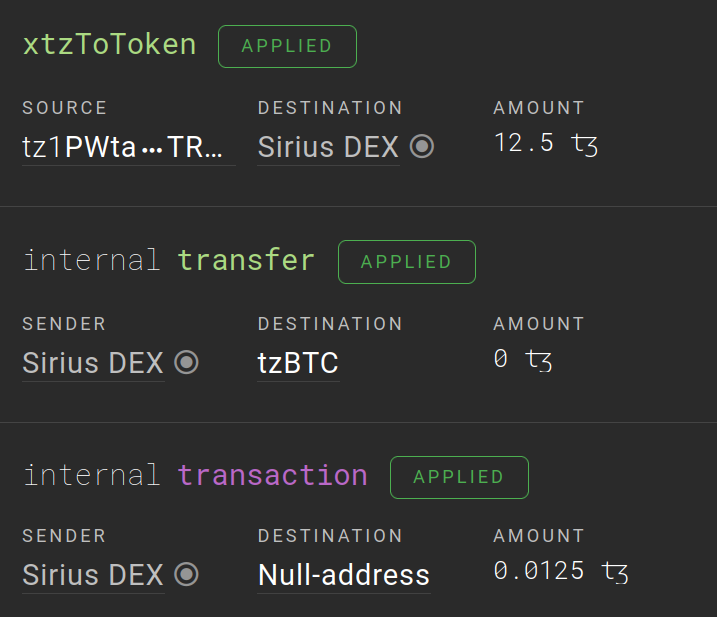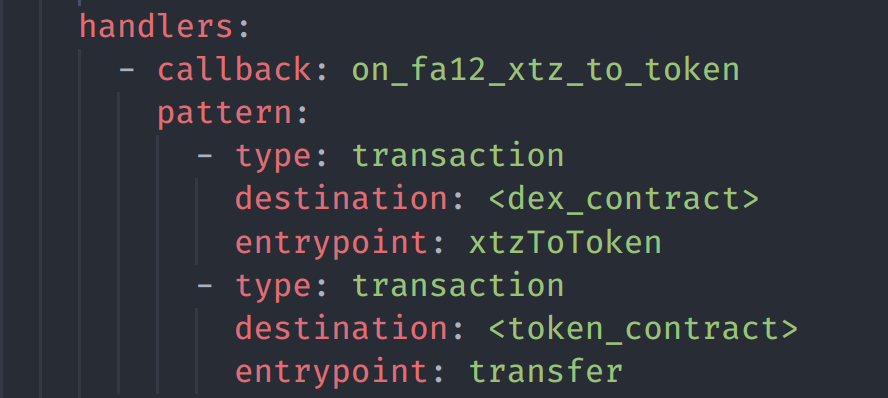

tezos.operations index
Operation index allows you to query only operations related to your dapp and match them with handlers by content. A single contract call consists of implicit operation and, optionally, internal operations. For each of them, you can specify a handler that will be called when the operation group matches. As a result, you get something like an event log for your dapp.
Handlers
Each operation handler config item contains two required fields:
callback— a name of async function with a particular signature; DipDup will search for it indipdup_indexer.handlers.<callback>module.pattern— a non-empty list of items that need to be matched.
indexes:
my_index:
kind: tezos.operations
datasources:
- tzkt
contracts:
- some_contract
handlers:
- callback: on_call
pattern:
- destination: some_contract
entrypoint: transfer
You can think of the operation pattern as a regular expression on a sequence of operations (both external and internal) with a global flag enabled (there can be multiple matches). Multiple operation parameters can be used for matching (source, destination, etc.).
When the operation group matches the pattern, DipDup creates arguments for the callback function and invokes it.
Typed and untyped arguments
You will get slightly different callback argument types depending on whether the pattern item is typed or not. If so, DipDup will generate the dataclass for a particular entrypoint/storage, otherwise, you will have to handle untyped parameters/storage updates stored in TzktOperationData model.
Applying filters
In pattern items, you can specify filters to narrow down the search. For example, you can match only operations sent to a particular address. Each operation type has its own set of filters.
Originations
| name | description | supported | typed |
|---|---|---|---|
originated_contract.address | Origination of exact contract. | 🟢 | 🟢 |
originated_contract.code_hash | Originations of all contracts having the same code. | 🟢 | 🟢 |
source.address | Originations sent by address. Special cases only, see below. | 🟡 | 🔴 |
source.code_hash | Not supported. | 🔴 | 🔴 |
Filtering originations by source.address is very slow and strict typing is not supported. For most cases originated_contract.code_hash suits better.
Transactions
| name | description | supported | typed |
|---|---|---|---|
source.address | Sent by exact address | 🟢 | 🔴 |
source.code_hash | Sent by any contract having this code hash | 🟢 | 🔴 |
destination.address | Invoked contract address | 🟢 | 🟢¹ |
destination.code_hash | Invoked contract code hash | 🟢 | 🟢¹ |
destination.entrypoint | Entrypoint called | 🟢 | 🟢 |
¹ when entrypoint is specified too
Smart rollup calls
| name | description | supported | typed |
|---|---|---|---|
source.address | Sent by exact address. | 🟢 | 🔴 |
source.code_hash | Not supported | 🔴 | 🔴 |
destination.address | Invoked contract address | 🟢 | 🔴 |
destination.code_hash | Not supported | 🔴 | 🔴 |
Optional items
Pattern items have optional field to continue matching even if this item is not found. It's usually unnecessary to match the entire operation content; you can skip external/internal calls that are not relevant. However, there is a limitation: optional items cannot be followed by operations ignored by the pattern.
pattern:
# Implicit transaction
- type: transaction
destination: some_contract
entrypoint: mint
# Internal transactions
- type: transaction
destination: another_contract
entrypoint: transfer
- type: transaction
source: some_contract
Specifying contracts to index
DipDup will try to guess the list of used contracts by handlers' signatures. If you want to specify it explicitly, use contracts field:
indexes:
my_index:
kind: tezos.operations
datasources:
- tzkt
contracts:
- foo
- bar
Specifying operation types
By default, DipDup processes only transactions, but you can enable other operation types you want to process:
indexes:
my_index:
kind: tezos.operations
datasources:
- tzkt
types:
- transaction
- origination
- migration
- sr_execute
Indexing smart rollups (Etherlink)
Since version 7.2 you can index Tezos smart rollups the same way as regular contracts. Rollups have addresses starting with sr1 prefix, they have only one entrypoint (default) and their storage is always empty. Everything else is roughly the same.
If you want to index a smart rollup, choose a demo_tezos_etherlink template when creating a new project.
contracts:
rollup:
address: sr1...
typename: rollup
indexes:
my_index:
kind: tezos.operations
datasources:
- tzkt
contracts:
- rollup
handlers:
- callback: on_rollup_call
pattern:
- destination: rollup
entrypoint: default
entrypoint field equal to default is required for rollup pattern items. Otherwise, the transaction will be treated as untyped.